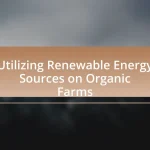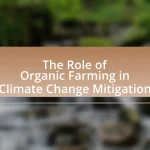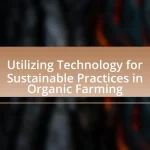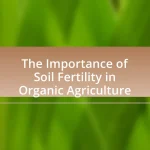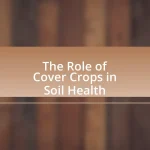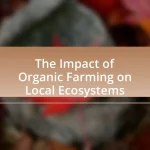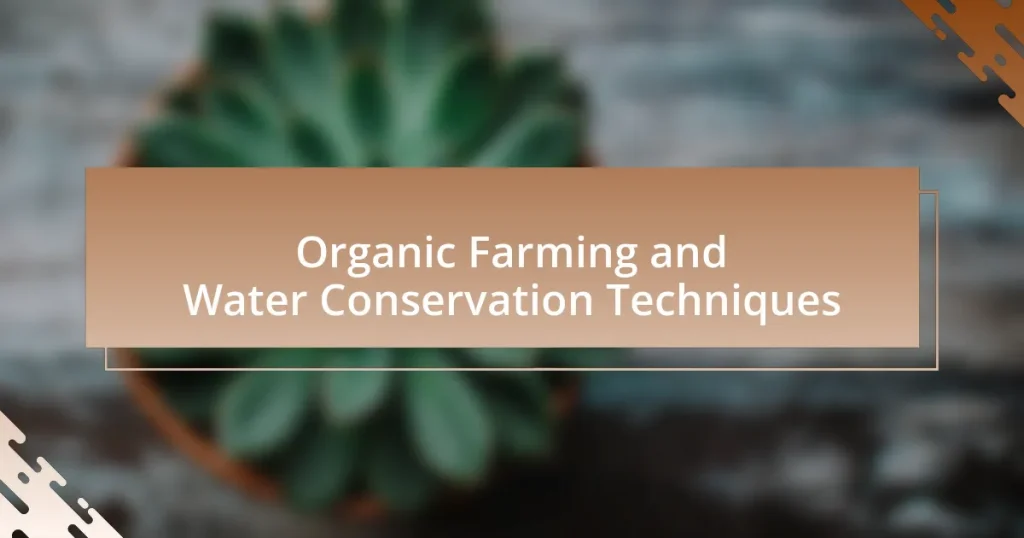Organic farming is an agricultural practice that prioritizes natural processes and materials, avoiding synthetic inputs to promote biodiversity and soil health. This article explores the relationship between organic farming and water conservation techniques, highlighting methods such as rainwater harvesting, drip irrigation, and mulching that enhance water efficiency and soil moisture retention. It discusses how organic practices improve water retention by up to 30%, the significance of soil health in water conservation, and the environmental impacts of water scarcity on agriculture. Additionally, the article outlines specific techniques and best practices for implementing effective water conservation strategies in organic farming, emphasizing their role in sustainable agricultural productivity.
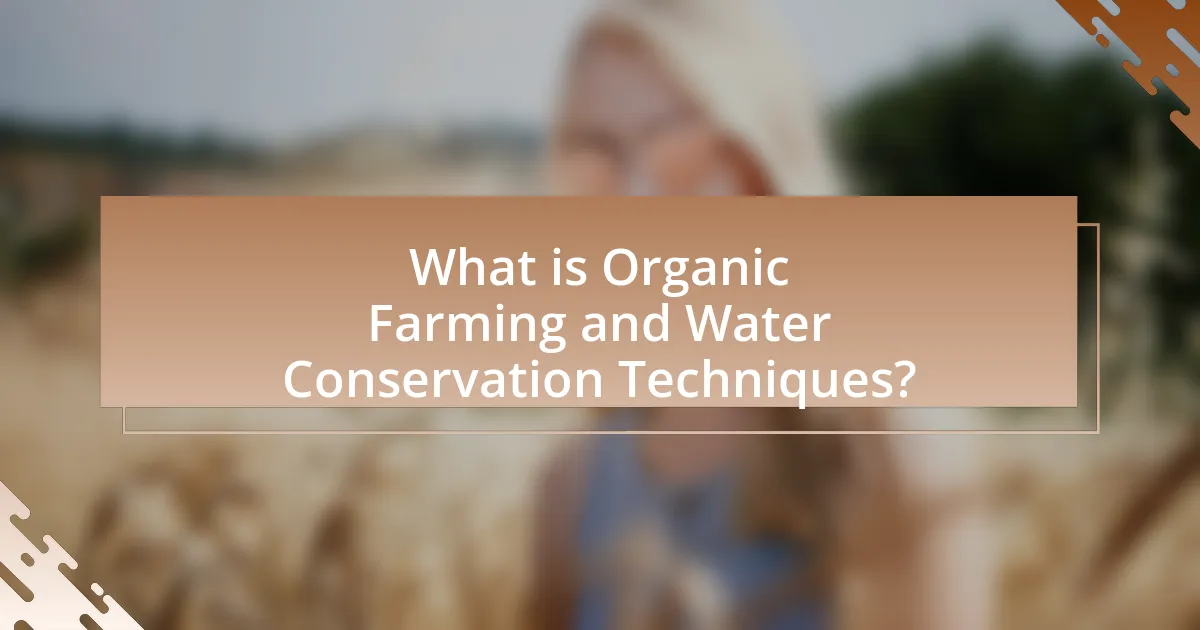
What is Organic Farming and Water Conservation Techniques?
Organic farming is an agricultural method that emphasizes the use of natural processes and materials, avoiding synthetic fertilizers and pesticides. This approach promotes biodiversity, soil health, and ecological balance, which are essential for sustainable farming practices. Water conservation techniques in organic farming include methods such as rainwater harvesting, drip irrigation, and mulching, which help to efficiently manage water resources and reduce waste. Research indicates that organic farming can improve water retention in soil by up to 30%, enhancing drought resilience and promoting sustainable water use.
How do organic farming practices contribute to water conservation?
Organic farming practices contribute to water conservation by enhancing soil health and structure, which improves water retention. Healthy soils, rich in organic matter, can hold more moisture, reducing the need for irrigation. Research indicates that organic farms can retain up to 30% more water compared to conventional farms due to their improved soil quality and biodiversity. Additionally, organic practices such as crop rotation and cover cropping help prevent soil erosion and promote infiltration, further conserving water resources.
What specific methods are used in organic farming to save water?
Organic farming employs several specific methods to save water, including mulching, crop rotation, and the use of cover crops. Mulching helps retain soil moisture by reducing evaporation and suppressing weeds, while crop rotation enhances soil structure and health, leading to improved water retention. Cover crops, such as legumes, improve soil fertility and reduce erosion, which also contributes to better water management. These practices are supported by research indicating that organic farming systems can use up to 30% less water compared to conventional methods, demonstrating their effectiveness in water conservation.
How does soil health impact water retention in organic farming?
Soil health significantly impacts water retention in organic farming by enhancing the soil’s structure and biological activity. Healthy soil, characterized by a rich organic matter content, improves its ability to hold water through increased porosity and aggregation. Research indicates that soils with high organic matter can retain up to 20% more water than those with low organic content, which is crucial for sustaining crops during dry periods. Additionally, beneficial microorganisms in healthy soil contribute to the formation of soil aggregates, further enhancing water infiltration and retention capabilities.
Why is water conservation important in agriculture?
Water conservation is crucial in agriculture because it ensures sustainable crop production while minimizing environmental impact. Efficient water use helps maintain soil health, reduces the risk of drought, and lowers operational costs for farmers. According to the Food and Agriculture Organization, agriculture accounts for approximately 70% of global freshwater withdrawals, highlighting the need for effective water management practices to secure food resources for a growing population. Implementing water conservation techniques, such as drip irrigation and rainwater harvesting, can significantly enhance water efficiency, leading to increased agricultural productivity and resilience against climate change.
What are the environmental impacts of water scarcity on farming?
Water scarcity negatively impacts farming by reducing crop yields, degrading soil quality, and increasing the risk of pest infestations. When water is limited, plants experience stress, leading to lower productivity and diminished food supply. A study by the Food and Agriculture Organization (FAO) indicates that agricultural water scarcity can reduce crop yields by up to 50% in some regions. Additionally, insufficient water availability can lead to soil erosion and nutrient depletion, as farmers may resort to unsustainable practices to compensate for the lack of moisture. This degradation of soil health further exacerbates the challenges of farming in water-scarce areas, making it difficult to maintain sustainable agricultural practices.
How does water conservation benefit crop yields in organic farming?
Water conservation significantly enhances crop yields in organic farming by ensuring that plants receive adequate moisture while minimizing waste. Efficient water management practices, such as rainwater harvesting and drip irrigation, lead to improved soil moisture retention and reduced evaporation losses. Research indicates that organic farms utilizing these techniques can achieve up to 20% higher yields compared to conventional methods, as evidenced by a study published in the Journal of Sustainable Agriculture, which found that optimized water use directly correlates with increased productivity in organic systems.
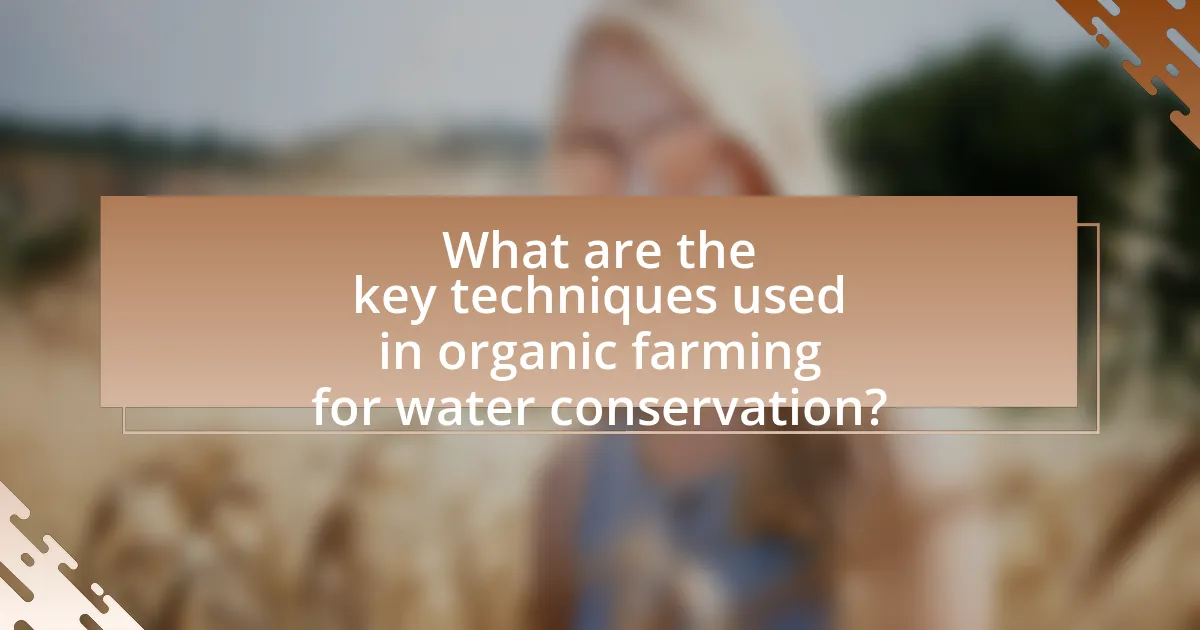
What are the key techniques used in organic farming for water conservation?
Key techniques used in organic farming for water conservation include mulching, crop rotation, and the use of cover crops. Mulching helps retain soil moisture by reducing evaporation and suppressing weeds, while crop rotation improves soil structure and health, enhancing its ability to retain water. Cover crops, such as legumes, improve soil fertility and prevent erosion, further aiding in water conservation. Research indicates that these practices can lead to a significant reduction in water usage, with studies showing that mulched fields can retain up to 50% more moisture compared to bare soil.
How does crop rotation enhance water conservation?
Crop rotation enhances water conservation by improving soil structure and increasing organic matter, which enhances the soil’s ability to retain moisture. When different crops are planted in succession, their varying root structures and nutrient requirements promote a healthier soil ecosystem. This diversity helps prevent soil compaction and erosion, allowing for better water infiltration and retention. Research indicates that fields with diverse crop rotations can retain up to 25% more water compared to monoculture systems, demonstrating the effectiveness of this practice in conserving water resources.
What crops are best suited for rotation to improve water efficiency?
Legumes, such as soybeans and peas, are best suited for rotation to improve water efficiency. These crops enhance soil structure and increase nitrogen availability, which can lead to better water retention in the soil. Research indicates that rotating legumes with cereals can reduce water usage by up to 20% while maintaining crop yields, as legumes improve soil health and moisture retention capabilities.
How does crop diversity affect water usage in organic farming?
Crop diversity significantly reduces water usage in organic farming by enhancing soil health and improving water retention. Diverse crops create a more complex root system, which helps to capture and hold moisture more effectively than monocultures. Research indicates that farms with higher crop diversity can reduce irrigation needs by up to 30%, as different plants utilize water at varying depths and rates, optimizing overall water use. Additionally, diverse cropping systems can improve soil structure and organic matter content, further enhancing the soil’s ability to retain water.
What role does mulching play in water conservation?
Mulching plays a crucial role in water conservation by reducing evaporation from the soil surface. This practice helps maintain soil moisture levels, which is essential for plant growth, especially in arid regions. Research indicates that mulched areas can retain up to 50% more moisture compared to bare soil, significantly decreasing the need for irrigation. Additionally, organic mulches improve soil structure and enhance water infiltration, further promoting efficient water use in agricultural practices.
What materials are commonly used for mulching in organic farming?
Common materials used for mulching in organic farming include straw, wood chips, grass clippings, leaves, and compost. These materials serve to suppress weeds, retain soil moisture, and improve soil health. For instance, straw is widely utilized due to its availability and effectiveness in moisture retention, while wood chips provide a long-lasting barrier against weeds. Research indicates that organic mulches can enhance soil structure and promote beneficial microbial activity, contributing to sustainable farming practices.
How does mulching influence soil moisture levels?
Mulching significantly enhances soil moisture levels by reducing evaporation and maintaining a stable temperature in the soil. The layer of mulch acts as a barrier, preventing direct sunlight from reaching the soil surface, which minimizes water loss through evaporation. Research indicates that mulched soils can retain moisture up to 50% more effectively than bare soils, leading to improved water availability for plants. Additionally, organic mulches, such as straw or wood chips, can improve soil structure over time, further enhancing moisture retention capabilities.
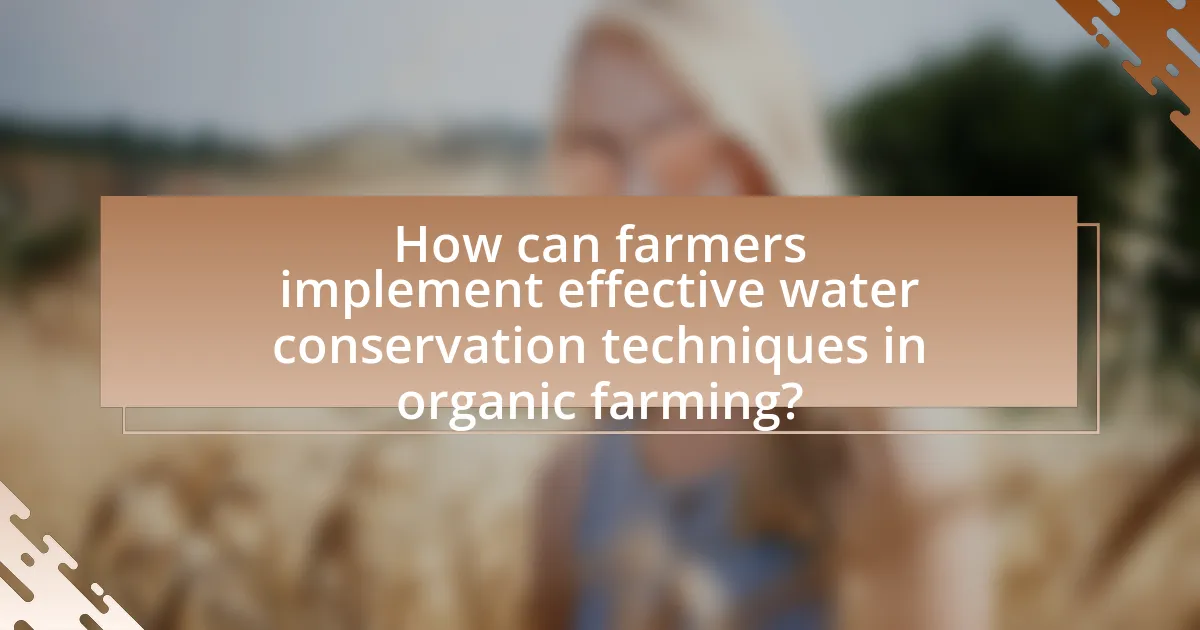
How can farmers implement effective water conservation techniques in organic farming?
Farmers can implement effective water conservation techniques in organic farming by utilizing methods such as drip irrigation, mulching, and rainwater harvesting. Drip irrigation delivers water directly to the plant roots, minimizing evaporation and runoff, which can lead to water savings of up to 60% compared to traditional irrigation methods. Mulching helps retain soil moisture, reduces evaporation, and suppresses weeds, further enhancing water efficiency. Rainwater harvesting allows farmers to collect and store rainwater for irrigation, providing a sustainable water source that can reduce dependency on groundwater. These techniques not only conserve water but also promote healthier soil and crop yields, aligning with the principles of organic farming.
What are the best practices for rainwater harvesting in organic farms?
The best practices for rainwater harvesting in organic farms include the installation of catchment systems, proper storage solutions, and efficient distribution methods. Catchment systems, such as roofs and paved surfaces, should be designed to maximize water collection while ensuring that materials used are non-toxic and compatible with organic standards. Storage solutions, like tanks or cisterns, must be made from food-grade materials to prevent contamination and should be covered to reduce evaporation and prevent mosquito breeding. Efficient distribution methods involve using drip irrigation or gravity-fed systems to minimize water loss and ensure that crops receive adequate moisture. These practices not only enhance water conservation but also support sustainable farming by reducing reliance on external water sources.
How can farmers design their farms to maximize rainwater collection?
Farmers can design their farms to maximize rainwater collection by implementing contour farming, creating swales, and utilizing rainwater harvesting systems. Contour farming involves plowing and planting across the slope of the land, which reduces runoff and encourages water infiltration. Swales are shallow, vegetated channels that capture and direct rainwater to specific areas, enhancing soil moisture retention. Additionally, installing rainwater harvesting systems, such as cisterns or barrels, allows farmers to collect and store rainwater for irrigation and other uses. These methods have been shown to increase water availability and improve crop yields, as evidenced by studies indicating that proper rainwater management can enhance agricultural productivity by up to 30%.
What tools and technologies assist in rainwater harvesting?
Tools and technologies that assist in rainwater harvesting include rainwater collection systems, storage tanks, filtration systems, and distribution networks. Rainwater collection systems, such as gutters and downspouts, channel rainwater from rooftops into storage tanks. Storage tanks, often made of materials like polyethylene or concrete, hold the collected water for later use. Filtration systems, including mesh screens and sediment filters, ensure that the harvested water is clean and safe for irrigation or other uses. Distribution networks, which can include pumps and irrigation systems, facilitate the use of stored rainwater in agricultural practices. These technologies enhance water conservation efforts in organic farming by providing a sustainable water source.
How can irrigation methods be optimized for water conservation?
Irrigation methods can be optimized for water conservation by implementing techniques such as drip irrigation, scheduling irrigation based on soil moisture levels, and utilizing rainwater harvesting systems. Drip irrigation delivers water directly to the plant roots, minimizing evaporation and runoff, which can reduce water usage by up to 60% compared to traditional methods. Scheduling irrigation based on soil moisture ensures that water is applied only when necessary, preventing overwatering and promoting healthier plant growth. Additionally, rainwater harvesting systems can capture and store rainwater for irrigation, further reducing reliance on groundwater and municipal water supplies. These methods collectively enhance water efficiency in organic farming practices.
What are the advantages of drip irrigation in organic farming?
Drip irrigation offers several advantages in organic farming, primarily by enhancing water efficiency and promoting healthier crop growth. This method delivers water directly to the plant roots, minimizing evaporation and runoff, which is crucial in organic practices that prioritize sustainability. Studies indicate that drip irrigation can reduce water usage by up to 50% compared to traditional irrigation methods, allowing organic farmers to conserve water resources effectively. Additionally, the targeted application of water helps prevent weed growth and reduces the risk of disease by keeping foliage dry, which is essential for maintaining organic standards.
How can farmers monitor soil moisture to improve irrigation efficiency?
Farmers can monitor soil moisture using soil moisture sensors, which provide real-time data on moisture levels in the soil. These sensors can be placed at various depths to assess moisture availability for crops accurately. Research indicates that utilizing soil moisture sensors can reduce water usage by up to 30% while maintaining crop yield, as they enable farmers to irrigate only when necessary, preventing over-irrigation and promoting efficient water use.
What practical tips can farmers follow to enhance water conservation in organic farming?
Farmers can enhance water conservation in organic farming by implementing techniques such as mulching, drip irrigation, and crop rotation. Mulching reduces evaporation and maintains soil moisture, while drip irrigation delivers water directly to plant roots, minimizing waste. Crop rotation improves soil structure and health, which can enhance water retention. Research indicates that these practices can lead to a 30-50% reduction in water usage compared to traditional methods, demonstrating their effectiveness in conserving water resources in organic farming.
